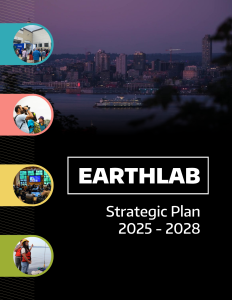Strategic Plan
We’re pleased to share the UW EarthLab 2025-2028 Strategic Plan. This updated roadmap helps us make decisions that honor both our mission and the communities we serve, ensuring that our efforts create lasting, equitable impact. If you have any questions or comments, please email earthlab@uw.edu.
Download the 2025-2028 Strategic PlanPrintable copies of the Strategic plan in PDF format are available below.
|
On this page
• Message from the EarthLab team
• Vision and Mission
• Organizational Timeline
• EarthLab Strategic Priorities & Action Areas
Message from the EarthLab team
In 2020, EarthLab began developing its first strategic plan to identify priorities and further clarify our position in the vast landscape of environmental work. Collaborating with partners in nonprofits, businesses, Tribes, public agencies, and UW faculty, staff, researchers, and students, we embraced our role as a boundary organization and committed to focusing our efforts on connecting the UW with the wider community by taking equitable action on climate change. With this direction, we are addressing two key issues: the untapped potential to strengthen UW resources to develop accessible climate change solutions, and the reality that climate change may affect all of us, but it does not affect everyone equally.
Five years of impact
Since we announced the plan in 2021, EarthLab has become a dynamic hub of activities, resources, and connection. We’ve invested in research that has produced meaningful solutions, such as communications tools for facing smoky days in Central Washington and supporting the adoption of green cleaning tools for food trucks across the state.
In 2022, we launched our paid summer internship program. Over the past four years, more than 950 undergraduates applied for the opportunity to build skills to prepare for a world where every job is a climate job. We’ve refined our shared services model that provides admin, human resources, grants, communications, and strategic support to other UW centers and initiatives, delivering efficiencies that expand what is possible for environmental research and training. And we’ve prioritized community connection and collaboration, hosting gatherings that bring people with diverse perspectives together to break bread, connect across differences, and spark new ideas for climate solutions. [Learn more about our impact to-date here.]
Reaffirming our commitment
As we near the end of 2025 — the original end date for our strategic plan — we are navigating a period of transition. The funding environment at federal and state levels is evolving, communities are adapting to new challenges, and higher education is undergoing broad shifts. Within EarthLab, the College of the Environment, and across UW, leadership changes bring both adjustment and the chance to reimagine the future. At the same time, a changing climate continues to shape lives and livelihoods around the world, underscoring the importance of our work and the opportunities before us to make a lasting impact.
In the face of these challenges, we remain steadfast in our approach to centering community and pushing boundaries on the systems that led us to where we are today.
Our strategic plan remains essential not just as a guide for our work, but as a shared commitment that aligns our diverse partners — from Tribes and nonprofits to students and faculty — around a common vision for climate action. In times of uncertainty, this roadmap helps us make decisions that honor both our mission and the communities we serve, ensuring that our efforts create lasting, equitable impact.
We’ve seen firsthand how small changes in the way we work combined with taking chances on new ideas can make a big difference. Grounded by these principles, we’re building on the momentum we’ve started and extending our strategic plan through 2028. As you read through this addendum, you’ll see that we’ve kept our four main action areas and many of the same goals, while fine-tuning our strategy to address the needs of our stakeholders today.
Hope for the future
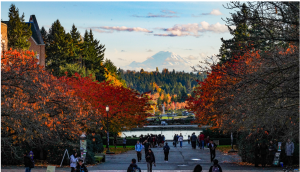
Stay tuned for announcements in the coming months [make sure you subscribe to our newsletter] as we aim to deliver on this plan. Between re-launching an updated Grants Program that will invest in new ways to convene and respond to challenges, in addition to developing new opportunities for UW-community connections, there will be many opportunities to get involved.
With the support of our interim executive director bringing a fresh approach to the work, an experienced leadership team and core team dedicated to the cause, and passionate supporters like you making this work possible, we’re hopeful for the future of EarthLab, for a future where people and planet thrive.
Onward,
The EarthLab Team
Vision & Mission
Our Vision
An equitable, just and sustainable world where people and planet thrive.
Our Mission
EarthLab’s mission is to push boundaries to develop innovative, just and equitable solutions to
environmental challenges and climate action. We do this by connecting across sectors and academic disciplines to inspire and incentivize new partnerships that bridge the UW and the wider community.
EarthLab’s Timeline
- 2009: EarthLab created by the University of Washington (UW) Board of Regents as part of the founding of the College of the Environment.
- 2012 – 2016: The Dean’s Office of the College of the Environment, the college advisory board, and a small group of early faculty advisors worked to define, name, fundraise and manage EarthLab’s ideation phase.
- 2017: EarthLab recruits first executive director.
- 2018: Developed a preliminary strategic framework. Launched the shared services model supporting EarthLab member organizations and the Innovation Grants Program.
- 2019: EarthLab initiated a process to create a five-year strategic plan for 2021-25.
- 2021: EarthLab launched its strategic plan.
- 2022: EarthLab launched the EarthLab Summer Internship Program.
- 2024: EarthLab released its first ever Impact Report
- 2025: EarthLab extended its strategic plan through 2028, to build off its successful ideas and impact
EarthLab’s Strategic Priorities and Action Areas
In 2021, EarthLab identified three strategic priorities and four “action areas” that illustrate how EarthLab will bring its mission to life. While the priorities and action areas remain the same through 2028, we updated the language and activities to reflect the current state and refined goals.
Three Strategic Priorities
EarthLab has established three strategic priorities that build on the strong foundation established during its initial start-up phase. These three priorities, slightly updated since 2021, are:
1. Activate, leverage and sustain a web of cross-boundary networks, relationships and resources
2. Enable the development of research, training, and solutions at the intersection of climate change and social justice
3. Secure a stable funding model for EarthLab
2020 Language |
2025 Language |
| Convene cross-cutting conversations | Creating connections at UW & in community |
| Invest in innovative, interdisciplinary and multi-sector collaboration | Investing in research co-created with community |
| Support the success of EarthLab member organizations | Expanding what is possible for environmental research & action |
| Foster the development of professionals who are skilled in transdisciplinary and applied work | Training & mentoring tomorrow’s climate leaders |
EarthLab Strategic Priorities & Action Areas
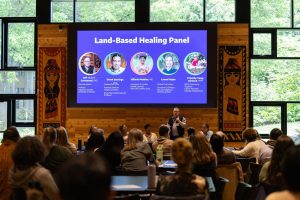
Action Area 1: Creating Connections at UW & in Community
Climate change is a systemic issue that requires coordination and understanding across different communities, sectors, and knowledge systems. Over the past five years, EarthLab has been tapped as a convener time and again, creating spaces that ignite new connections that become the foundation for increasing understanding, building trust, and developing new ideas — activities that are critical to creating effective and sustainable solutions.
2025 Current State
It’s no secret that the Covid-19 pandemic changed how we connect. Over the past five years, we have hosted a mix of virtual, hybrid, and in-person events to reach a broader audience and strengthen connections. The virtual format made it possible to bring new voices “to campus,” such as authors Anand Giridharadas, Kate Zernike, and Leah Thomas. In person events, such as the Fostering Climate Connections series for UW faculty interested in interdisciplinary partnerships for climate research, or the Climate Justice Conversations and Connections event for UW students to bring forward ideas, provided supportive spaces for deeper conversations. The 2022 Sparking Climate Connections featured over 100 virtual lightning talks followed by an in-person reception to build community. This is just a sliver of activity over the past five years that has inspired conversations on topics such as freshwater access, ocean equity, mental health and climate change, and environmental politics, to name a few. EarthLab has also become an active participant in partner events, speaking at conferences or hack-a-thons, or simply attending gatherings and listening for ways to create new connections and resources.
Updated Goals
1: EarthLab is a well-known “connector” and hub of activity on campus and in community for community engaged environmental and climate research
2: EarthLab has trusted relationships with community organizations, external to UW, due to our honest commitment to “showing up” (i.e., taking the time to earn that trust and understand the context of the challenges we may endeavor to work on together)
Objectives
1: Enhance strategic communications efforts to continue to increase overall awareness of EarthLab, within and outside of the UW
2: Increase the number of UW stakeholders (faculty, staff, students) from across the tri-campus actively engaged with EarthLab, through hosting and attending on-campus events
3: Develop a three-year community engagement plan to broaden and deepen engagement with external community partners (public agencies, nonprofits, Tribes, businesses, etc.)
Action Area 2: Investing in Research Co-Created with Community
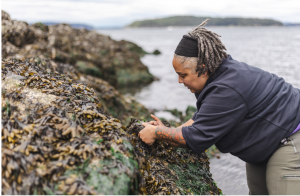
Since its inception, EarthLab has been committed to breaking the mold of traditional environmental research, seeking to incentivize projects that inspire action. EarthLab invests in University of Washington researchers, students and partners from the wider community to co-produce meaningful solutions and strategies addressing environmental issues.
2025 Current State
EarthLab launched the Innovation Grants Program in 2018, awarding nearly $2M of grant funds to 29 teams over five years, for interdisciplinary and community-engaged projects on pressing environmental challenges and (later) at the intersection of climate and social justice. The grant teams developed relationships, answered research questions, or piloted a concept. In 2024, after five cohorts of funding, EarthLab paused the program to evaluate and benchmark against other funding models at UW and other universities nationally.
Updated Goals
1: Expand the Innovation Grants Program to fund small, medium, and large-scale research
2: Continue to develop innovative programming for researchers and partners in response to real-world climate justice challenges
Objectives
1: Relaunch an expanded version of the Innovation Grants program
2: Develop a resources bank and connections that support a community of practice at the UW for community-engaged environmental and climate research
Action Area 3: Expanding What is Possible for Environmental Research & Action
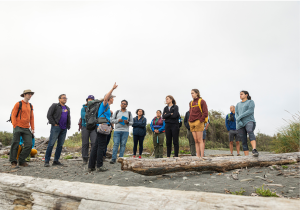
Since the beginning, EarthLab was designed to be a home for environmental research centers and initiatives that believe when we come together, we are greater than the sum of our parts. The EarthLab core team supports “Member Organizations” with critical technical, operational, and communications support to ease administrative loads and allow each organization to focus on what it does best: produce and share top-tier science that leads to more resilient communities in the Northwest and beyond. By being part of EarthLab, these organizations have the additional opportunity of cross-pollinating ideas with each other. Faculty, researchers, staff and students gain opportunities for connection outside of their traditional academic homes, fulfilling the promise of EarthLab’s “pushing boundaries” approach to imagining a better future together.
2025 Current State
The heart of the EarthLab’s Member Organization model lies within the finance and administrative pod: EarthLab staff who manage grants, contracts, payments, human resources, and other administrative tasks. Since 2021, EarthLab has managed over $35M in federal grants and over 50 non-federal grants and contracts and has hired and trained over 120 employees — all through managing a new UW financial management system and college funding structure, and a changing federal and state budget landscape.
Updated Goals
1: Member organizations feel supported and are better equipped to deliver their individual research and training missions
2: Member organizations achieve expanded or deeper connections with each other, with the UW, and with the wider community, which may lead to innovative ideas and solutions
Objectives
1: Develop service agreements to maintain and continuously improve support services, including responding to diverse administrative, technical, and communication needs
2: Create opportunities that will increase or deepen connections between EarthLab member organizations and other partners
3: Support member organization staff by cultivating a greater sense of community and connection with each other
Action Area 4: Training & Mentoring Tomorrow’s Climate Leaders
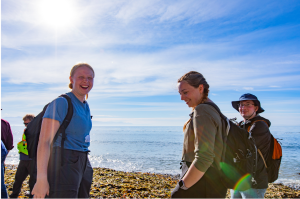
Students are at the heart of any university, and the University of Washington — one of the premier public research universities in the world — is no exception. EarthLab is committed to developing programming and training opportunities for UW students interested in new approaches to problem-solving, communications, and partnership in environmental and climate justice work.
2025 Current State
In 2022, EarthLab launched The EarthLab Summer Internship Program, a paid nine-week environmental and climate justice internship open to any undergraduate student enrolled at the University of Washington who is interested in building and expanding their foundational knowledge around ways that our changing environment disproportionately impacts people and communities. Since then, over 950 students have applied for just 54 placements, showing the popularity of this program. In addition to this flagship training program, EarthLab has developed creative ways to engage students, either through events, digital art contests, or seminars provided in partnership with the Program on the Environment.
Updated Goals
1: Expand the EarthLab Summer Internship Program (more students can participate) through partnerships with internship sites within and beyond the UW
2: Increase the number of UW students actively engaged with EarthLab overall
Objectives
1: Launch a second cohort of interns placed in new sites across the UW
2: Develop summer internship program alumni engagement
3: Offer academic seminars in partnership with UW departments, workshops, and events for students to participate in EarthLab activies, outside of the EarthLab Summer Internship Program
Additional Resources
Our first Strategic Plan
Our Impact
